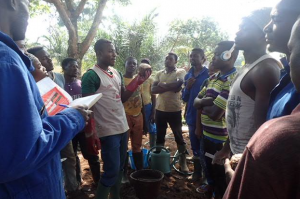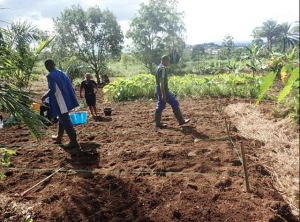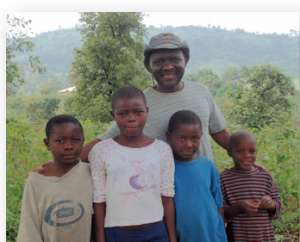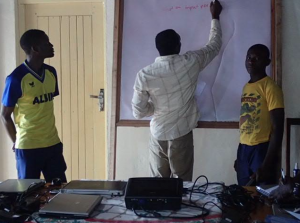Martin Niboh wants to change the face of poverty in Africa, but he doesn’t want to follow the old-fashioned model of handouts, leading to dependence and a beggar’s mindset.  He has adopted a new, financially self-sustaining model for improving the lives of the rural poor in Africa, and it involves faith, freedom, free enterprise, sustainable agriculture, education and love. An interesting mix in the world of mission/charity work and business development in Africa, but one he’s willing to bet the farm on. Literally.
He has adopted a new, financially self-sustaining model for improving the lives of the rural poor in Africa, and it involves faith, freedom, free enterprise, sustainable agriculture, education and love. An interesting mix in the world of mission/charity work and business development in Africa, but one he’s willing to bet the farm on. Literally.
Sixteen years ago, in the midst of a successful teaching career as a professor of physics and mathematics in the United States, Martin founded the Torchbearer Foundation for Missions, Reconciliation and Development. The Foundation now has launched a unique brand of farm-study schools, a modern spin on the old notion of barter and trade that may be just the ticket for a generation of young people to realize their potential. Called the School of Christian Social Entrepreneurship, this farm-school offers an entrepreneurial education that is hands-on, where work is an integral and mandatory part of the educational process and allows students to attend school tuition-free.  As their labor bears fruit, these students will turn around and invest right back into the school and their communities.
As their labor bears fruit, these students will turn around and invest right back into the school and their communities.
Born in a poor village in Cameroon in 1963, Martin was a bright boy who advanced quickly through elementary school in his rural village. He was able to secure an academic scholarship to attend a vocational junior high in another town, followed by another academic scholarship to a boarding school for high school. He completed the program, finishing eighth in the country on the national exam. He attended college in Cameroon, where he earned an undergraduate degree in physics and graduated at the top of his class.
There were scholarship opportunities for Martin to go to England to study agriculture, or Germany to study aeronautical engineering, or China to study civil engineering. Martin’s desire, however, was to go to America. He had read the American Founding Fathers and wanted to see for himself the nation they had founded. Scholarships to American universities were difficult to come by, so Martin taught high school for three years in order to save enough for one semester of tuition in the U.S. He was accepted at Kent State University in Ohio, and he departed for America with no intention of looking back. He went on to receive his PhD in Nuclear Physics from Kent State, and launched a productive career and life in Missouri as a professor of physics and mathematics at the College of the Ozarks and father to five children with his wife Caroline.
But as the years passed and with regular visits to Cameroon, he found the entrenched rural poverty in his native country more and more heartbreaking. And frustrating. For so many years, charity in Africa had been a band-aid not a cure. Money and leadership flowed from the top down, and it failed. Martin began to see that a new model needed to be implemented, one that flowed from the bottom up, one that allowed people to be responsible for their own success, to take ownership of their future.
He began to feel a calling to help, to become an instrument of change for the people of Africa. To that end, he gathered a few like-minded people in Missouri and Cameroon, and the Torchbearer Foundation for Missions, Reconciliation and Development was born.  Since then, the Foundation has worked in some of Africa’s poorest communities, training future entrepreneurs, helping small businesses succeed and creating a network of like-minded African entrepreneurs who share Torchbearer’s commitment to creating positive change. Projects are local and need-based. Martin connects with a village to find out their needs, which vary from village to village. In one community it might be a health clinic, in another a need for primary school, and computer training in still another.
Since then, the Foundation has worked in some of Africa’s poorest communities, training future entrepreneurs, helping small businesses succeed and creating a network of like-minded African entrepreneurs who share Torchbearer’s commitment to creating positive change. Projects are local and need-based. Martin connects with a village to find out their needs, which vary from village to village. In one community it might be a health clinic, in another a need for primary school, and computer training in still another.
After 16 years of effective work in Cameroon, Martin is taking the Torchbearer Foundation to the next level by establishing Igniting Africa – a program designed to build tuition-free farm-schools across the continent of Africa.  These tuition-free schools will train students in Christian Social Entrepreneurship. Martin calls them farm-schools because the idea is for the farms to generate the finances for operating the schools. Thousands of acres of land have been acquired for this purpose. The first of these schools is now in session with the first class of students, or mentees, in Bamenda, Cameroon. Each student has set forth a plan that includes both a business project, such as poultry farming and crop production, and a humanitarian project, such as mentoring orphans in their home villages. Upon graduation, students will be provided with the seed capital to launch business and humanitarian projects under the mentoring partnership with the school. The business sustains the student and also finances the student’s humanitarian project. In this way, the school will produce job creators, as opposed to job seekers.
These tuition-free schools will train students in Christian Social Entrepreneurship. Martin calls them farm-schools because the idea is for the farms to generate the finances for operating the schools. Thousands of acres of land have been acquired for this purpose. The first of these schools is now in session with the first class of students, or mentees, in Bamenda, Cameroon. Each student has set forth a plan that includes both a business project, such as poultry farming and crop production, and a humanitarian project, such as mentoring orphans in their home villages. Upon graduation, students will be provided with the seed capital to launch business and humanitarian projects under the mentoring partnership with the school. The business sustains the student and also finances the student’s humanitarian project. In this way, the school will produce job creators, as opposed to job seekers.
 A man strongly committed to his Christian faith, Martin is a firm believer that we also are bound together by our common humanity. People of different faiths and beliefs can and do live side by side in Cameroon, as they do in the U.S. So the path he has set for the School of Christian Social Entrepreneurship is community-based and inclusive, harnessing the rich cultural fabric of the region. And by emphasizing love, education and collaboration – with a strong dose of entrepreneurship, faith, freedom and free enterprise – Martin believes that a new and better Africa will follow.
A man strongly committed to his Christian faith, Martin is a firm believer that we also are bound together by our common humanity. People of different faiths and beliefs can and do live side by side in Cameroon, as they do in the U.S. So the path he has set for the School of Christian Social Entrepreneurship is community-based and inclusive, harnessing the rich cultural fabric of the region. And by emphasizing love, education and collaboration – with a strong dose of entrepreneurship, faith, freedom and free enterprise – Martin believes that a new and better Africa will follow.
